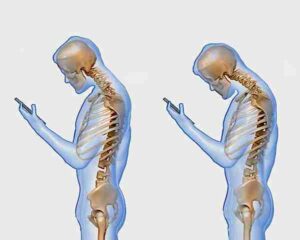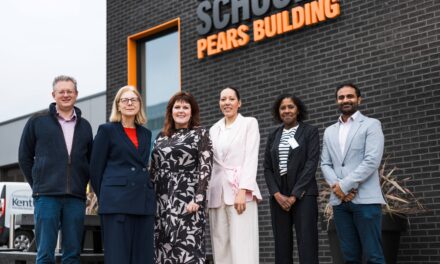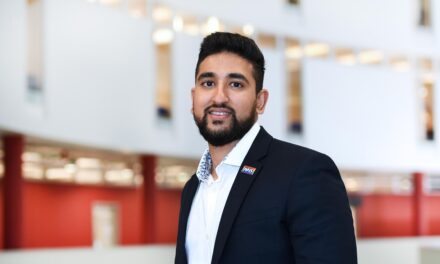Maggie McDowell is a Physiotherapist, and has worked in range of physiotherapy settings including both musculoskeletal and frailty and sub-acute orthopaedic services. She has been working with the KSS AHSN Health Innovation Programme to develop her innovation.
- Tell us about your innovation – what and why?
My innovation is an app – we’re currently workshopping the name. It is designed to help people avoid sustained postures while using their mobile phones, to encourage them to hold their phone more upright and straighten up to reduce upper back and neck problems.
I used to commute by train, and I would watch everyone round me bent over at the neck, looking at their phones held horizontally. The NHS as a whole has been seeing higher numbers of referrals for postural injuries, linked to smartphone use, and I could see all these commuters lining that up for themselves, so I thought that there must be some way to improve posture and reduce NHS referrals at the same time.
- What was the lightbulb moment?
It initially began as a joke – I talked about designing a backpack with a curved stick to hold people’s phones at the right height, but someone pointed out to me that a smartphone has motion-recognition features, so it would be possible to use those, and create an app.
The initial goal was to reduce postural related referrals, but the more I researched, I realised the first goal needs to be raising awareness to create change, so that’s what I’m working on.

The second skeleton shows poor posture of a user bending too far to read their phone, where the first image has a better posture.
- What’s been your innovator journey highlight to date?
The idea has been at the back of my mind for a long time now. I planned to do something about it during my maternity leaves, but didn’t manage to. I applied for Bid for Better funding through the Royal Surrey hospital, to develop the app idea, but didn’t get it – which was kind of a relief, as I didn’t have a clue what I was doing! KSS AHSN was part of the judging panel, and in their feedback pointed me towards the Bridging the Gap Health Innovation Programme and encouraged me to apply.
On that, one of the questions was ‘are you a clinical entrepreneur?’ I answered ‘no’. But KSS AHSN pushed me, saying ‘Are you a clinician?’, and ‘Do you have a clinical idea that you want to develop? That makes you an entrepreneur!’ So that was a big step forward, realising that I was a clinical entrepreneur. Getting a place on the course has really been a highlight, for sure.
- How has KSS AHSN supported you?
Through the HIP course I’ve learned more about developing an innovation – what I’m getting into, what the next steps are, and how to take things forward. I learned that data is important, and how to gather relevant and useful information to support my app’s development; I have two studies open at the moment collecting data for me, and I’ve also made connections, and learned how important my new and existing connections are. As a result, I’ve been meeting with musculoskeletal physios, who will be key influencers for the app. People on the HIP course were often much further ahead with their innovations than I am, and said ‘I wish I’d had a chance to plan’, so being here early has given me that chance.
- What has been your toughest obstacle to date?
Time! Finding the time to focus on my app, alongside the day job, COVID-19, and 2 young children. The HIP course clarified what I need to do with the app, and helped me formulate 3-year and 5-year plans, so I’ve actually changed my hours at work to make time to work on it.
- Hopes for the future?
As a physiotherapist, I want to make a difference, and give people better postural awareness.
As an NHS employee, I want to reduce referrals for posture-related issues.
As a mum, I know that tech is normal for kids now, and I want to make a change now that will benefit them in the long run.
And for me, I want to build new skills, to move into a new area of my professional life.
- A typical day for you would include?
Well, a typical Monday to Thursday, I sort the kids out then go to work. Friday is App day, so I’m making links with others, going to meetings, having conversations with GPs, looking at data from the audits, and planning the next stages. It’s a balance between home and work, and making a difference.
- What three bits of advice would you give budding innovators?
1 – Make the time.
2 – Use your contacts and connections, people in your field, your friends and family. Even if they’re not directly connected, the people around you may still have useful thoughts on what you’re doing. I was initially cagey about my idea, not telling people, but it’s been really helpful to talk. I’m building things that would never have occurred to me, in partnership with others now.
3 – Believe it’s a good idea! But don’t be scared of changing your idea. Adaptation, to fit new information, is a good thing.
- What did you value the most from the KSS AHSN Health Innovation Programme course?
The chance to do an elevator pitch, to polish that, plus the speed mentoring was very positive. It was a very intense week, but everyone there was so enthusiastic – I was buzzing for a month!
- How did you adapt your approach to your company after completing the HIP?
I feel like I have a better starting point now, and greater understanding of what to do.
- Would you recommend the HIP course to future innovators
Yes!
It has been really fantastic, and supportive of everyone’s different ideas. People were at different levels on their journeys, and being at the beginning, I found some of the stories a bit intimidating. However, it’s not a bad thing to start with more information, and be able to plan. I’ve been able to make some great connections, and explore areas to look into that I’d not have had without the course.
Maggie’s app is still very much under development, but watch this space, and see where she takes it over the next couple of years. And make sure you’re not bending over at the neck while you’re scrolling on your phone!





